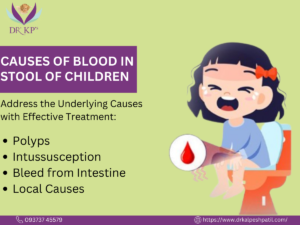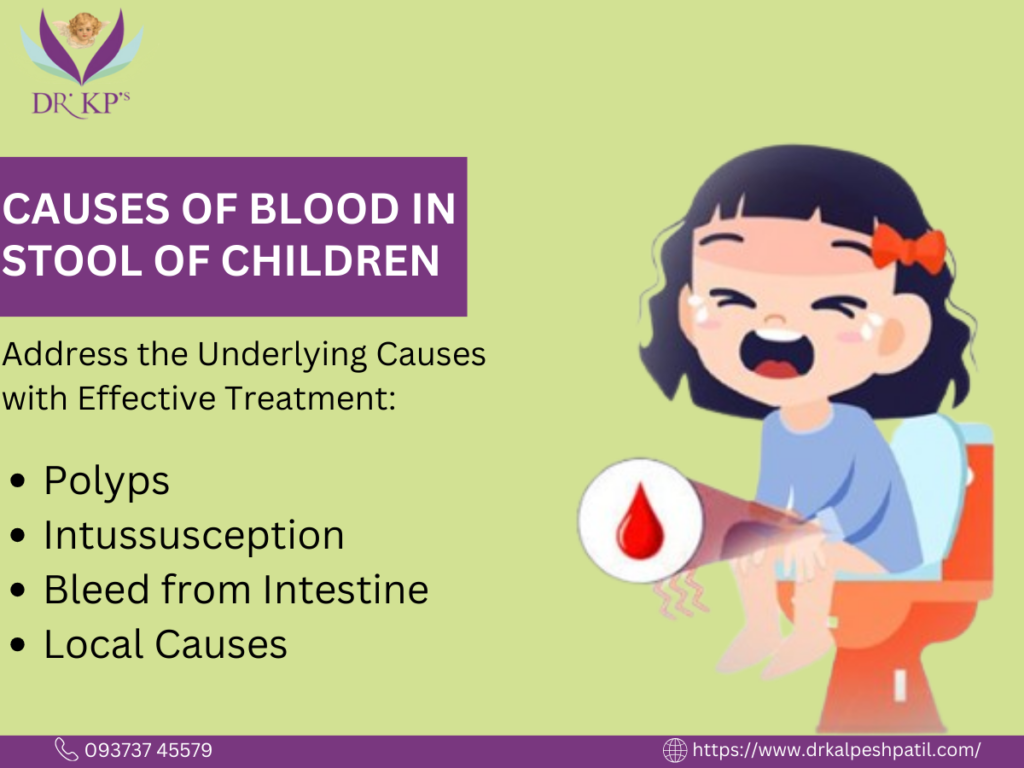Introduction: As a parent, discovering blood in your child’s stool can be alarming and worrisome. However, it’s essential to understand various underlying causes for this symptom, ranging from benign to potentially serious conditions. Consulting with specialists such as Dr. Kalpesh Patil, a Pediatric Surgeon, Laparoscopic Surgeon, Pediatric Urologist, and Pediatric Gastroenterologist in Pune, can provide comprehensive evaluation and treatment tailored to your child’s needs.
Causes and Treatment:
- Polyps: Polyps are abnormal growths in the colon or rectum that can lead to bleeding. While most polyps are harmless, some may develop into colorectal cancer over time. In children, polyps are relatively rare but can occur, especially in those with a family history of polyps or colorectal cancer.
Treatment: a. Endoscopic removal: For larger polyps, endoscopic removal may be necessary. Dr. Patil specializes in minimally invasive techniques such as laparoscopy, which reduces discomfort and promotes quicker recovery. b. Surveillance: Regular monitoring is essential, especially for children with a genetic predisposition to polyps. Dr. Patil can develop a personalized surveillance plan to detect and manage any recurrent polyps effectively.
- Intussusception: Intussusception is a condition where one segment of the intestine slides into another, causing obstruction and potential blood in the stool. It is more common in infants and toddlers.
Treatment: a. Hydrostatic reduction: Dr. Patil may recommend a non-surgical procedure called hydrostatic reduction, where air or liquid is pumped into the intestine to correct the intussusception. b. Surgery: In severe cases or when hydrostatic reduction is unsuccessful, surgical intervention may be necessary. Dr. Patil’s expertise in laparoscopic surgery ensures minimal scarring and faster recovery for your child.
- Bleeding from the Intestine: Various factors can lead to bleeding from the intestine, including infections, inflammatory bowel disease (IBD), and vascular malformations.
Treatment: a. Antibiotics or antiviral medications: If an infection is the underlying cause, appropriate medications will be prescribed to treat the infection and stop the bleeding. b. Anti-inflammatory drugs: For conditions like IBD, medications to reduce inflammation and control symptoms will be recommended. Dr. Patil will closely monitor your child’s response to treatment and adjust medications as needed. c. Endoscopic procedures: In cases of vascular malformations or bleeding ulcers, endoscopic procedures may be performed to stop the bleeding and promote healing.
- Local Causes: Local causes of blood in the stool may include anal fissures, hemorrhoids, or rectal trauma.
Treatment: a. Topical ointments or suppositories: For minor issues such as anal fissures or hemorrhoids, Dr. Patil may recommend topical treatments to alleviate symptoms and promote healing. b. Dietary and lifestyle changes: Adjustments in diet and toilet habits can help alleviate symptoms and prevent recurrence of local causes of bleeding in the stool.
Conclusion: Blood in the stool of children can be a distressing symptom for parents, but it’s crucial to seek prompt medical attention for proper evaluation and treatment. Dr. Kalpesh Patil, with his expertise as a Pediatric Surgeon, Laparoscopic Surgeon, Pediatric Urologist, and Pediatric Gastroenterologist in Pune, offers comprehensive care tailored to each child’s needs. By addressing underlying causes effectively, Dr. Patil ensures the best possible outcomes for your child’s health and well-being.

| #PediatricSurgeonPune |
| #PediatricLaparoscopicSurgeonPune |
| #PediatricUrologistPune |
| #PediatricGastroenterologistPune |
| #DrKalpeshPatilPediatricSurgeon
|

